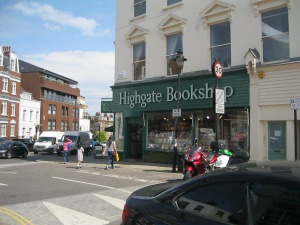
Dulwich Books, 6 Croxted Road, London, SE21 8SW
Searching for books is a great way to explore a city you think you know. I’ve lived in London for more than ten years. In that time I’ve lived in six houses in four different areas of this megacity. But that hasn’t stopped me from falling in love with independent bookshops in every corner of London. Even though I now live way South, I still go to visit West End Lane Books in Hampstead and Brick Lane Books in the East End. But that makes it all the more lovely when I get to explore my local area.
I live not too far from West Dulwich, which is the home of the delightful Dulwich Books. Dulwich is a weird place. Most of the land is still own by the Dulwich Estate, a charitable foundation that acquired it over a hundred years ago. Because it’s privately owned it means that the area feels really different to surrounding areas like trendy East Dulwich, Herne Hill and West Norwood. In additional to being very well-heeled, West Dulwich also feels like a rural village. The urban legend is that the original chairs of the Dulwich Estate trust, the plot of private land that West Dulwich sits on, were teetotal way back when, so there are no pubs in the whole of West Dulwich – though there are several great ones just outside the boundaries of the Dulwich Estate. They also apparently had something against double decker buses because all the bus routes that wind through the estate are singles.
On an unassuming street corner in Croxted Road, you’ll find Dulwich Books, as well as a smattering of other little shops including a bakery over the road. Modest and unpretentious from the outside, this little shopfront reveals a fantastic local bookshop, embedded in its community, with a smart and intentional selection of books and a friendly, welcome atmosphere. The staff here take bookselling seriously and every time I pop in I’m impressed with the thoughtful curation of new titles, old classics given a bit of attention, and staff recommendations. The bookshop is great for its extensive fiction selection, but I also like it for the the focus it puts on books about culture, politics and current affairs.

In the back of the bookshop, there is a fantastic children’s section. When I went in most recently it was half term and there were two families who were clearly using the children’s section as entertainment for the morning, with their little ones happily playing with toys and reading while the bookseller patiently chatted to their parents. I particularly like this bookshop because they’ve clearly put a lot of effort into sourcing diverse children’s books. In 2018, Arts Council England and the Centre for Literacy in Primary Education published research showing that only 1% of main characters in children’s literature were people of colour. Compared to 32% of schoolchildren in London. This means that the stories children spend their childhoods reading are failing to represent them and their communities, and failing to represent the diversity of the city and country they will grow up in. This has a huge impact on who children think reading is for, and which stories matter. Seeing yourself represented does wonders for self-esteem and aspiration.
There are certainly lots of brilliant initiatives seeking to redress the balance, notably Knights Of publishers who have a pop up in Brixton Market. Dulwich Books shows how bookshops can be an agent for change, by stocking a good selection of children’s books with diverse characters and perspectives. Thank goodness for that.

The bookshop hosts a series of regular events, profiling local authors and hosting an annual literary festival across Dulwich and Balham. I can highly recommend signing up to their email newsletter which is always full of recommendations and events that are enticing enough to tempt you down to this part of London that transport infrastructure forgot.
So how to describe Dulwich Books. Old favourite? Local stalwart? Social hub? Source of inspiration? I think the world benefits from having multiple perspectives. So, all of the above.

 Harbour Books, 21 Harbour St, Whitstable, Kent, CT5 1AQ
Harbour Books, 21 Harbour St, Whitstable, Kent, CT5 1AQ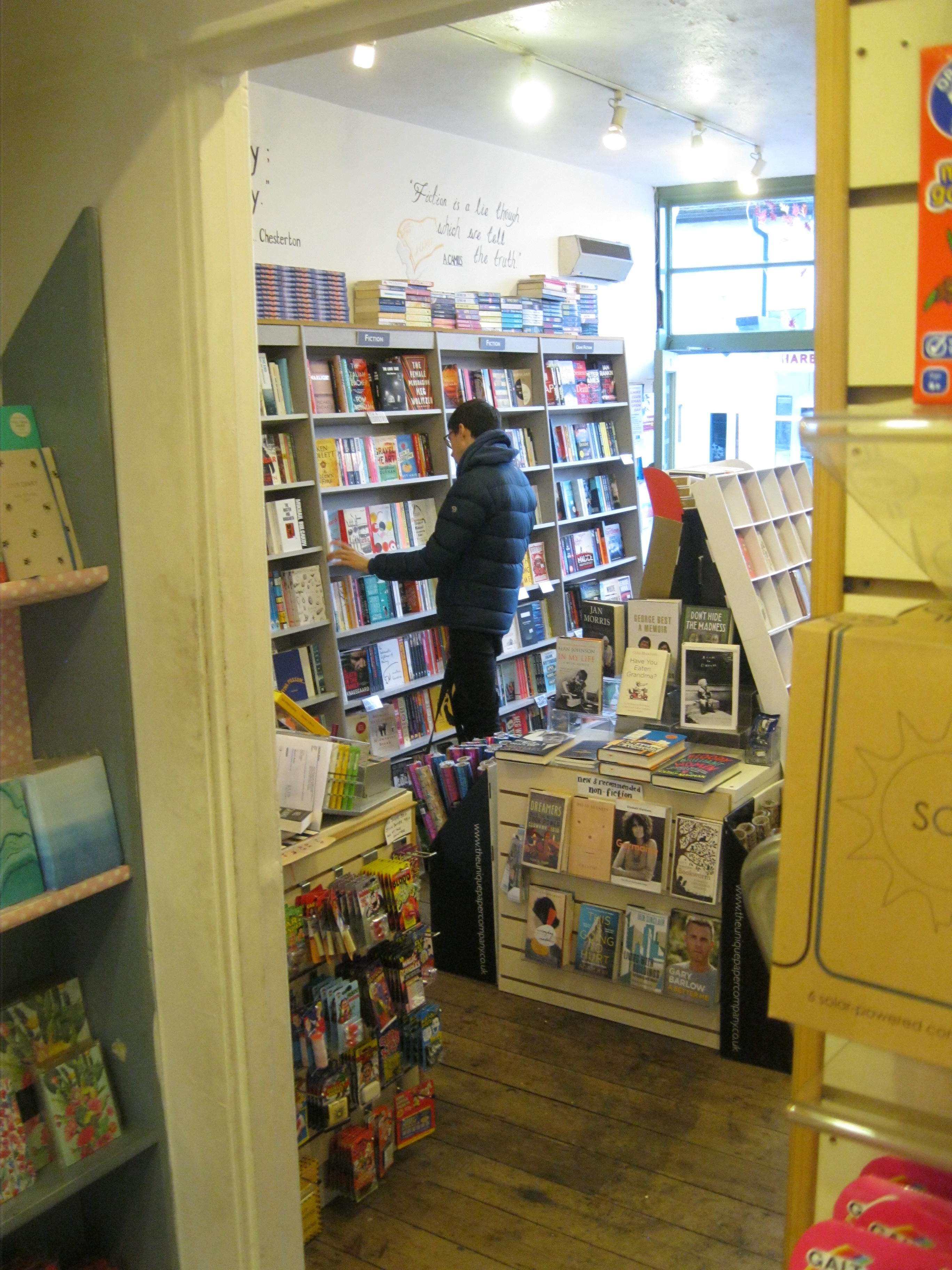
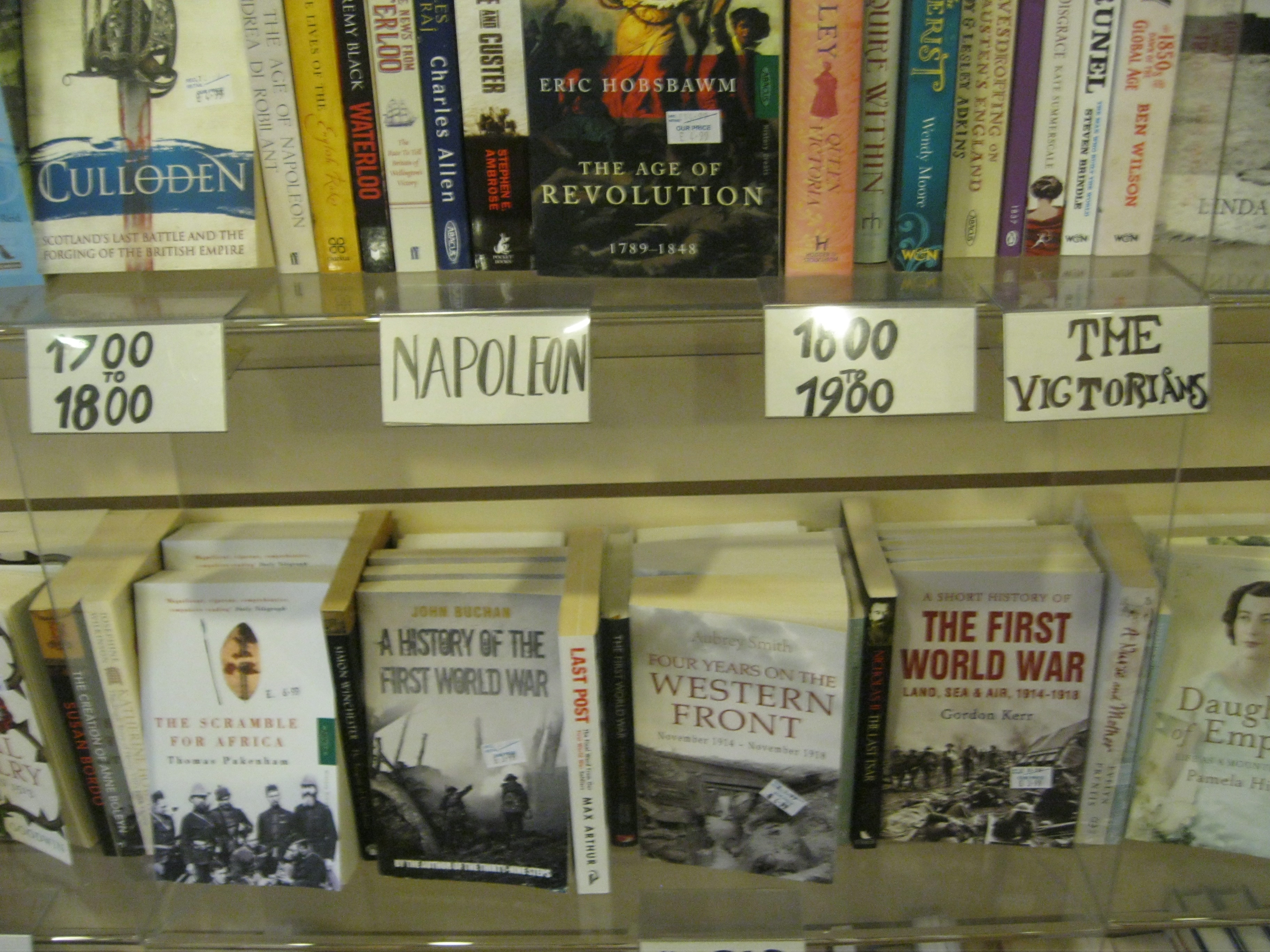

 Golden Hare Books, 68 St Stephen Street, Edinburgh, EH3 5AQ
Golden Hare Books, 68 St Stephen Street, Edinburgh, EH3 5AQ







 Librería El Lector, Calle San Francisco 213, Arequipa, Peru
Librería El Lector, Calle San Francisco 213, Arequipa, Peru
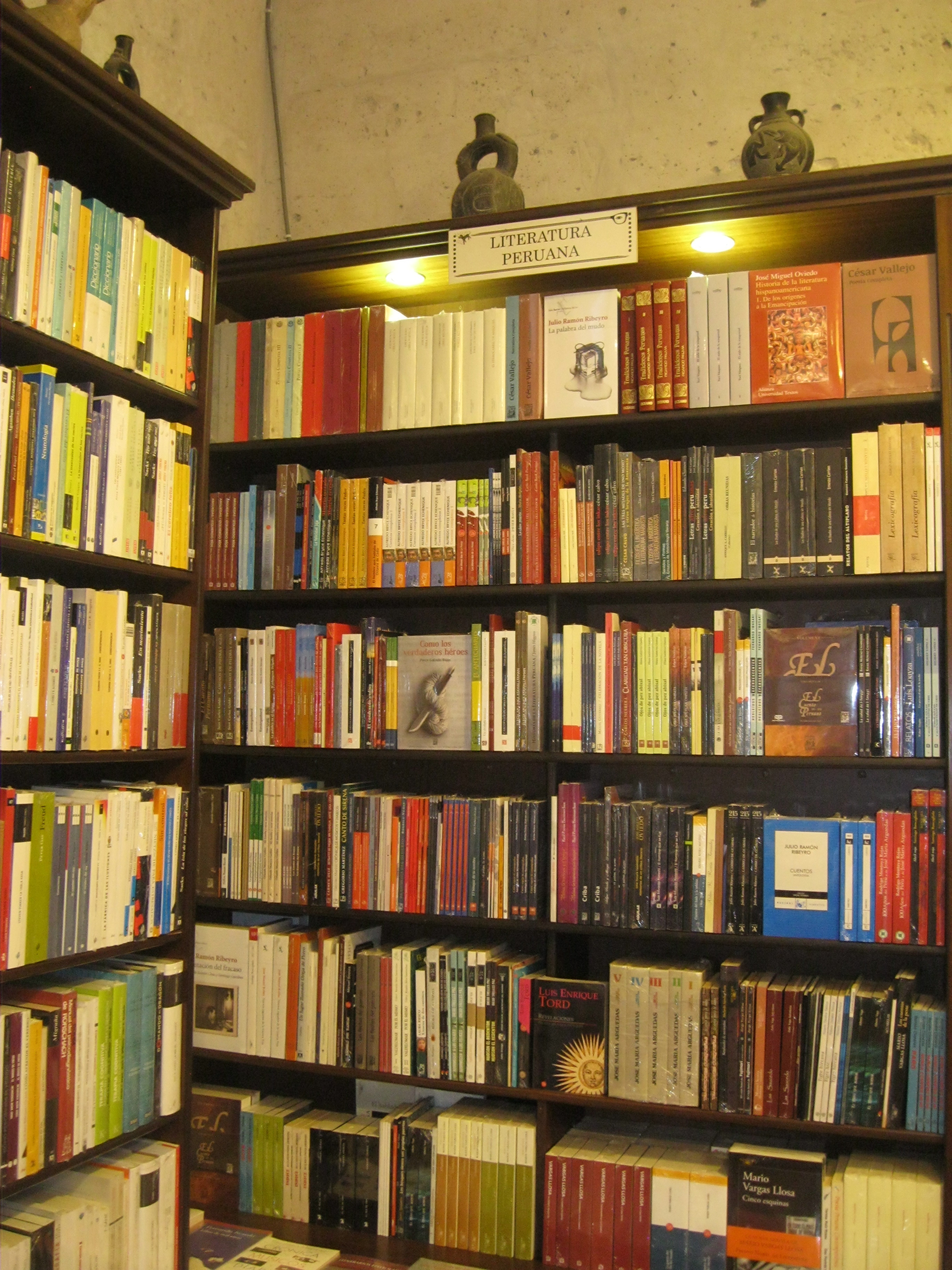





 Book-ish, 18 High Street, Crickhowell, Powys, NP8 1BD
Book-ish, 18 High Street, Crickhowell, Powys, NP8 1BD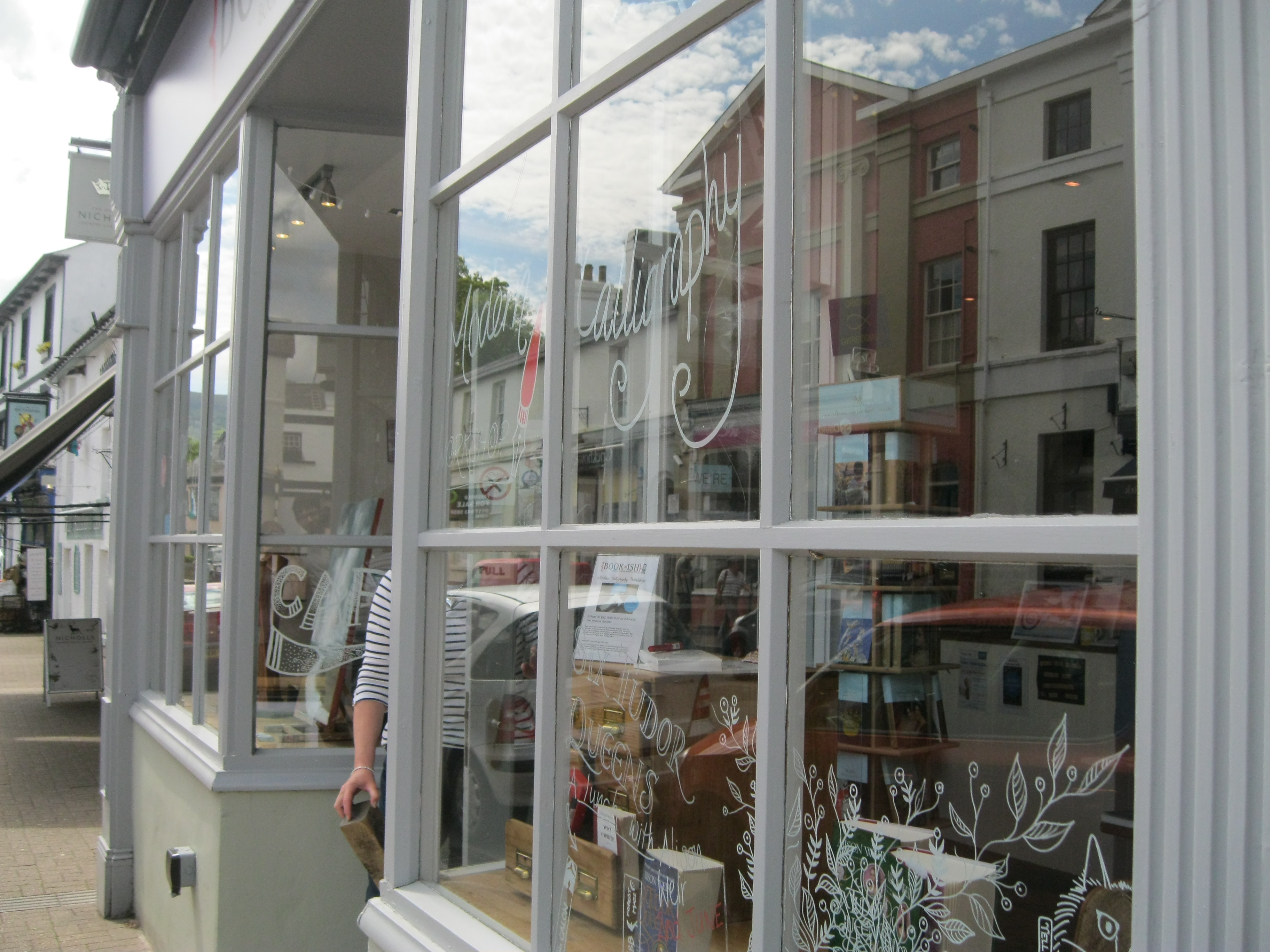 The glass windows at the front of the shop are speckled with advertisements for events, readings and classes, and in May, were beautifully decorated with swirling letters, delicate plants and curlicues, which were promoting an upcoming Calligraphy workshop. Whimsical, literary and fun, I can’t imagine who could possibly walk past this shop without stopping.
The glass windows at the front of the shop are speckled with advertisements for events, readings and classes, and in May, were beautifully decorated with swirling letters, delicate plants and curlicues, which were promoting an upcoming Calligraphy workshop. Whimsical, literary and fun, I can’t imagine who could possibly walk past this shop without stopping. space. Normally, the chidren’s section is tucked away at the back, but here, even in the front room, you find that children’s books and grown-up books are given pretty much equal amounts of space, and presented alongside each other, which is probably why there are so many families inside. Unlike the browsers who come and go, many of the families look like they are setting up camp for the day, because turn the corner and there’s even more to discover; a whole children’s room with books from floor to ceiling reveals itself. No adults are allowed, so mums, dads and other guardians will just have to sit and have a coffee and a Welsh cake in the charming cafe at the back.
space. Normally, the chidren’s section is tucked away at the back, but here, even in the front room, you find that children’s books and grown-up books are given pretty much equal amounts of space, and presented alongside each other, which is probably why there are so many families inside. Unlike the browsers who come and go, many of the families look like they are setting up camp for the day, because turn the corner and there’s even more to discover; a whole children’s room with books from floor to ceiling reveals itself. No adults are allowed, so mums, dads and other guardians will just have to sit and have a coffee and a Welsh cake in the charming cafe at the back. But of course the kids can’t have all the fun. Aside from this one room to which they lay claim, the rest of the bookshop is ripe for discovery, and encourages the browser to pick up something they’ve never heard of before. With an admirable collection of local and Welsh writers, it’s a great opportunity to delve into a literature you might not be familiar with. There is also a good selection of literary and popular fiction and some fascinating non-fiction titles, mainly in history and culture. I can imagine this would be a boon to anyone headed to Hay but concerned they’ll not look the part without a hefty non-fiction tome.
But of course the kids can’t have all the fun. Aside from this one room to which they lay claim, the rest of the bookshop is ripe for discovery, and encourages the browser to pick up something they’ve never heard of before. With an admirable collection of local and Welsh writers, it’s a great opportunity to delve into a literature you might not be familiar with. There is also a good selection of literary and popular fiction and some fascinating non-fiction titles, mainly in history and culture. I can imagine this would be a boon to anyone headed to Hay but concerned they’ll not look the part without a hefty non-fiction tome. from toddler to teenager, the fiction-lover to the Welsh-language enthusiast, the home cook to the gardener, from your Corbynista cousin to the Leave-voting great-uncle who you’re starting to wish had decided to skip the family holiday this year. Secondly, it is a genuine delight to spend time here. The kindness of the helpful staff, the smells from the cafe, the beautiful, clean design of the shop and the presence of many species of books combine to make it somewhere that I could gladly have spent hours in. In some bookshops, it’s not about getting in and finding the perfect book for the rest of your holiday, it’s about being in a place that excites, delights and inspires, or perhaps just soothes. On a sunny day in May, the place was beautiful, the sunlight pouring in through the wide glass windows and a soft breeze dancing in through the open door. But I can imagine it would be just as pleasant in proper Welsh wet weather, where it would keep the outside world and the inside world inspiring.
from toddler to teenager, the fiction-lover to the Welsh-language enthusiast, the home cook to the gardener, from your Corbynista cousin to the Leave-voting great-uncle who you’re starting to wish had decided to skip the family holiday this year. Secondly, it is a genuine delight to spend time here. The kindness of the helpful staff, the smells from the cafe, the beautiful, clean design of the shop and the presence of many species of books combine to make it somewhere that I could gladly have spent hours in. In some bookshops, it’s not about getting in and finding the perfect book for the rest of your holiday, it’s about being in a place that excites, delights and inspires, or perhaps just soothes. On a sunny day in May, the place was beautiful, the sunlight pouring in through the wide glass windows and a soft breeze dancing in through the open door. But I can imagine it would be just as pleasant in proper Welsh wet weather, where it would keep the outside world and the inside world inspiring.

 and the mirrors on the ceiling, the shelves, which are already packed to capacity with books, seem to carry on forever in every direction, including upwards into the sky. You can only stand there for a moment, stunned, while you take in your surroundings and internally map out the beautiful wooden shelves, painted a welcoming bright yellow. Throughout the shop are little reading nooks where you can sit and admire the books. In some bookshops his would seem a bit gimmicky, but here they are not just helpful, but perhaps even necessary. With every surface – vertical, horizontal and diagonal – absolutely buried in books, I was often grateful for the ability to sit down in one of these little nooks and take a breath while I examined a book or tried to get my head around the layout of a particular section.
and the mirrors on the ceiling, the shelves, which are already packed to capacity with books, seem to carry on forever in every direction, including upwards into the sky. You can only stand there for a moment, stunned, while you take in your surroundings and internally map out the beautiful wooden shelves, painted a welcoming bright yellow. Throughout the shop are little reading nooks where you can sit and admire the books. In some bookshops his would seem a bit gimmicky, but here they are not just helpful, but perhaps even necessary. With every surface – vertical, horizontal and diagonal – absolutely buried in books, I was often grateful for the ability to sit down in one of these little nooks and take a breath while I examined a book or tried to get my head around the layout of a particular section. something new that I need to snap up immediately, then rush home to turn it over, touch the cover, smell the pages, read and reread every word on the outside and crack it open to start reading as soon as possible. At Libreria, that ability to discover something exciting and inspiring takes precedent – and quite rightly so – over navigability. Rather than a simple ‘Fiction A-Z’, the shelves in Libreria meander in and out of logical order, more in keeping with the way your eye moves along a shelf of books anyway. Every now and then there is a vague sense of alphabetisation for a little while as you scan a row of books, but this can disappear suddenly and inexplicably, morphing into a completely different part of the alphabet or an entirely new system of ordering, so I quite quickly gave up trying to impose my own ideas of what should come next.
something new that I need to snap up immediately, then rush home to turn it over, touch the cover, smell the pages, read and reread every word on the outside and crack it open to start reading as soon as possible. At Libreria, that ability to discover something exciting and inspiring takes precedent – and quite rightly so – over navigability. Rather than a simple ‘Fiction A-Z’, the shelves in Libreria meander in and out of logical order, more in keeping with the way your eye moves along a shelf of books anyway. Every now and then there is a vague sense of alphabetisation for a little while as you scan a row of books, but this can disappear suddenly and inexplicably, morphing into a completely different part of the alphabet or an entirely new system of ordering, so I quite quickly gave up trying to impose my own ideas of what should come next. The sections in this bookshop are not titled ‘Fiction’, ‘Non-Fiction’, ‘Art’ and ‘Philosophy’. Instead you’ll find ‘Ways of Seeing’, ‘Enlightenment’, ‘Mothers, Madness and Whores’ or ‘The Future of Life and Death’. Yes, that does sound a bit pretentious. Of course it does. But I think it’s always useful to have our notions of genre disrupted, and it’s fascinating to group books together in different and surprising ways. This system also makes it really clear from the outset that there is no point looking for something specific; on this journey you are in the passenger seat, being driven wherever the bookshop wants you to go, rather than where you think you should be going next.
The sections in this bookshop are not titled ‘Fiction’, ‘Non-Fiction’, ‘Art’ and ‘Philosophy’. Instead you’ll find ‘Ways of Seeing’, ‘Enlightenment’, ‘Mothers, Madness and Whores’ or ‘The Future of Life and Death’. Yes, that does sound a bit pretentious. Of course it does. But I think it’s always useful to have our notions of genre disrupted, and it’s fascinating to group books together in different and surprising ways. This system also makes it really clear from the outset that there is no point looking for something specific; on this journey you are in the passenger seat, being driven wherever the bookshop wants you to go, rather than where you think you should be going next. and Shami Chakrabarti. Chakrabarti’s choices were fascinating and included The Arrival, a beautiful graphic novel about migration by Shaun Tan. We ended up buying two books: The Witches: Salem 1692, a satisfyingly thick history book for £20 and the Selected Stories of Sylvia Townsend Warner, of whom I hadn’t heard before but whose stories sound irreverent and powerful and focus on ‘the oddities of love.’ This set me back £18, which seems a lot for a paperback. And obviously I’m not comparing that with Amazon, but with other independent bookshops of a similar calibre who provide excellent service and a delightful experience, but without taking the piss on prices. Still, in the scheme of things, this is a small price to pay for an hour spend in Libreria and two amazing books.
and Shami Chakrabarti. Chakrabarti’s choices were fascinating and included The Arrival, a beautiful graphic novel about migration by Shaun Tan. We ended up buying two books: The Witches: Salem 1692, a satisfyingly thick history book for £20 and the Selected Stories of Sylvia Townsend Warner, of whom I hadn’t heard before but whose stories sound irreverent and powerful and focus on ‘the oddities of love.’ This set me back £18, which seems a lot for a paperback. And obviously I’m not comparing that with Amazon, but with other independent bookshops of a similar calibre who provide excellent service and a delightful experience, but without taking the piss on prices. Still, in the scheme of things, this is a small price to pay for an hour spend in Libreria and two amazing books. deny that it’s a brilliant place, because it’s a space in which you can leave behind the noise and information overload of the outside world and instead focus on books alone, in a setting that allows for creativity, spontaneity and discovery. This is wonderful and necessary, but it’s hardly some super creative new hipstery thing that no one’s ever thought of before. It’s just…a bookshop. That’s what a good bookshop is, and what it does. The self-congratulatory tone of a lot of the press coverage makes it sound like they’re the first ones to hit on this totally quirky and twee idea. This feels a bit insulting to bookshops like
deny that it’s a brilliant place, because it’s a space in which you can leave behind the noise and information overload of the outside world and instead focus on books alone, in a setting that allows for creativity, spontaneity and discovery. This is wonderful and necessary, but it’s hardly some super creative new hipstery thing that no one’s ever thought of before. It’s just…a bookshop. That’s what a good bookshop is, and what it does. The self-congratulatory tone of a lot of the press coverage makes it sound like they’re the first ones to hit on this totally quirky and twee idea. This feels a bit insulting to bookshops like 

 considering that it sits in the shadow of York Minster, one of the largest cathedrals in Europe. But inside, there are books. Which means that inside, it’s bigger than you could possibly imagine. Inside, it contains more information that you could ever learn, more characters than you’ll ever know, more reasons to laugh, cry, rejoice, despair, be inspired, be depressed and ask questions than you would ever create on your own. And all in a single room not much bigger than my kitchen.
considering that it sits in the shadow of York Minster, one of the largest cathedrals in Europe. But inside, there are books. Which means that inside, it’s bigger than you could possibly imagine. Inside, it contains more information that you could ever learn, more characters than you’ll ever know, more reasons to laugh, cry, rejoice, despair, be inspired, be depressed and ask questions than you would ever create on your own. And all in a single room not much bigger than my kitchen.
 non-fiction. Does the Little Apple have everything? No, stupid; it’s too little. But it’s got far more good stuff than most of us will ever need, let alone deserve. Such is the magic of good books; they expand time and space. They make a tiny, poky little room feel never-ending like a palace. They make an afternoon stretch time back and forth, so it’s like a year and also like 5 seconds at the same time, and then, like an elastic, when you close the book, it snaps back and it’s just an afternoon again. The Little Apple Bookshop is a place where one could easily get lost in space and time, even if you haven’t much of either.
non-fiction. Does the Little Apple have everything? No, stupid; it’s too little. But it’s got far more good stuff than most of us will ever need, let alone deserve. Such is the magic of good books; they expand time and space. They make a tiny, poky little room feel never-ending like a palace. They make an afternoon stretch time back and forth, so it’s like a year and also like 5 seconds at the same time, and then, like an elastic, when you close the book, it snaps back and it’s just an afternoon again. The Little Apple Bookshop is a place where one could easily get lost in space and time, even if you haven’t much of either.
 extortionate cost of living behind and start again up North. For now, though, I’m just a traveler, dependent on the hospitality of others and, as Blanche DuBois put it, the kindness of strangers. This means that while I’m in York and away from home, I get to take refuge from my everyday life and instead spend some time in someone else’s everyday life. Now, in York, that someone could be anyone a Roman administrator, a Viking settler, an Anglo-Saxon priest, a Victorian writer or a 21st century student. York has had so many lives already, as evidenced by its name. When the Romans first founded the city and built its still-standing walls in71 CE, they called it Eboracum. Under the Anglo-Saxons this became Eoforwic, then Jorvik under the Vikings and finally York, via various Middle English iterations including Yerk, Yourke and Yarke over the years. In this city there are endless possible narratives to slip yourself into as you shed your self for a little while.
extortionate cost of living behind and start again up North. For now, though, I’m just a traveler, dependent on the hospitality of others and, as Blanche DuBois put it, the kindness of strangers. This means that while I’m in York and away from home, I get to take refuge from my everyday life and instead spend some time in someone else’s everyday life. Now, in York, that someone could be anyone a Roman administrator, a Viking settler, an Anglo-Saxon priest, a Victorian writer or a 21st century student. York has had so many lives already, as evidenced by its name. When the Romans first founded the city and built its still-standing walls in71 CE, they called it Eboracum. Under the Anglo-Saxons this became Eoforwic, then Jorvik under the Vikings and finally York, via various Middle English iterations including Yerk, Yourke and Yarke over the years. In this city there are endless possible narratives to slip yourself into as you shed your self for a little while. both are fundamentally about leaving behind what is known and familiar and journeying into a different place and a different self. Sometimes this is quite a terrifying prospect, but it can also be an incredibly comforting one as well. Growing up, one of the things that books were to me was a refuge. When family life was loud, when I didn’t want to answer questions, when I simply wanted to disappear, the best way to do this was to open a book. You see, being a girl with her nose in a book is like having an invisibility cloak. No one seems to see you, the book is your shield and it keeps prying eyes and minds at a distance. Little do they know, inside your cloak, a whole world is being built around you, seen from a new and exciting vantage point. It’s just like walking along the streets of a new city; your anonymity keeps you safe from having to engage, lets you hide out a little longer in the secret adventure you’re having on your own.
both are fundamentally about leaving behind what is known and familiar and journeying into a different place and a different self. Sometimes this is quite a terrifying prospect, but it can also be an incredibly comforting one as well. Growing up, one of the things that books were to me was a refuge. When family life was loud, when I didn’t want to answer questions, when I simply wanted to disappear, the best way to do this was to open a book. You see, being a girl with her nose in a book is like having an invisibility cloak. No one seems to see you, the book is your shield and it keeps prying eyes and minds at a distance. Little do they know, inside your cloak, a whole world is being built around you, seen from a new and exciting vantage point. It’s just like walking along the streets of a new city; your anonymity keeps you safe from having to engage, lets you hide out a little longer in the secret adventure you’re having on your own.
 British History, Archaeology, Ancient History, Military, European, American and World History and, somewhat oddly, Transport. Fiction dominates the basement, with many classics available for discounted prices. They have every single Neil Gaiman book, all sitting in a pile on the floor and all for £3. There are new books, used books, rare and special edition books, prints and maps and all sorts beyond that! There’s everything from crime and mystery to folklore and fairy tale sections. The shelves seem to scream, ‘You can be anyone in here!’
British History, Archaeology, Ancient History, Military, European, American and World History and, somewhat oddly, Transport. Fiction dominates the basement, with many classics available for discounted prices. They have every single Neil Gaiman book, all sitting in a pile on the floor and all for £3. There are new books, used books, rare and special edition books, prints and maps and all sorts beyond that! There’s everything from crime and mystery to folklore and fairy tale sections. The shelves seem to scream, ‘You can be anyone in here!’ and never-never lands, but in the end, I bought a hardcover first edition of The Second Virago Book of Fairytales by Angela Carter for £6. Like me, Angela Carter was fascinated by fairy tales and folk tales and believed that they have significant insights into why our culture is the way it is, as well as being an excellent example of oral storytelling and quite fun to write and rewrite.
and never-never lands, but in the end, I bought a hardcover first edition of The Second Virago Book of Fairytales by Angela Carter for £6. Like me, Angela Carter was fascinated by fairy tales and folk tales and believed that they have significant insights into why our culture is the way it is, as well as being an excellent example of oral storytelling and quite fun to write and rewrite.